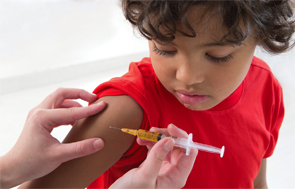
Vaccine development may be the single most impactful advancement in the history of medicine. Despite this, there is a strong anti-vaccination movement.
JPC-PROD/shutterstock.com
The boy who could not walk: S.L. is a previously healthy 10-year-old boy who has not walked for three months. Physical examination reveals swollen wrists, knees, ankles and several toes. There is reduced hip range of motion and flexion contractures of both knees. He can stand with assistance, but is unable to take a single step. Laboratory testing reveals elevated inflammatory markers, anemia and a positive HLA-B27. MRI reveals erosions and bone edema of both SI joints. He is diagnosed with juvenile ankylosing spondylitis and treatment with methotrexate and a TNF inhibitor is recommended. As per well-established guidelines, routine childhood vaccinations are recommended prior to initiation of immunosuppressive therapy.1 However, he has never received any of the recommended childhood vaccines, and his parents do not want their son to be vaccinated now.
The rationale for the treatment recommendations and the guidelines for vaccination are explained to his parents. They are in agreement with methotrexate and TNF inhibitor treatment but they are not willing to vaccinate their son. Given the risks of taking anti-rheumatic medications without receiving recommended vaccinations, what should be done?
The Vaccine Controversy
Vaccine development may be the single most impactful advancement in the history of medicine. Despite this, there is a strong anti-vaccination movement, which can be traced back to controversies around smallpox vaccination practices and the founding of the Anti-Vaccination Society of America in 1879. Fast-forward to 1998 when The Lancet published Andrew Wakefield’s paper about an association between the MMR vaccine and autism.2 This resulted in an explosion of mistrust around childhood vaccines. Wakefield’s paper was subsequently retracted in 2010 when re-analysis revealed serious flaws in methodology; larger studies failed to demonstrate a significant correlation between vaccination and autism.3 Yet the reluctance to vaccinate continues today for many parents.
In fact, vaccine refusal has become such a common problem for general pediatricians that many are tempted to dismiss these families from their practice. Given that the primary responsibility of the pediatrician is to the child, and that as pediatricians it is our duty to forge a partnership with families with the shared goal of optimizing their child’s health, most pediatricians would agree that the provider should not discharge the patient. However, the case of the child who will be immunosuppressed by virtue of the medications that you are prescribing presents a different risk–benefit analysis. This pushes the need for agreement between the provider and the family to an even higher level.
Balancing Individual Autonomy & Herd Immunity
Ethical concerns around vaccination frequently center on the tensions between what is best for the individual, what is best for society and how to respect patient autonomy. Vaccination provides real benefit—and typically, little risk—to individuals. Herd immunity ultimately benefits all of society. The impact of the loss of herd immunity is starkly demonstrated by recent outbreaks of preventable disease in communities with high non-vaccination rates.4



